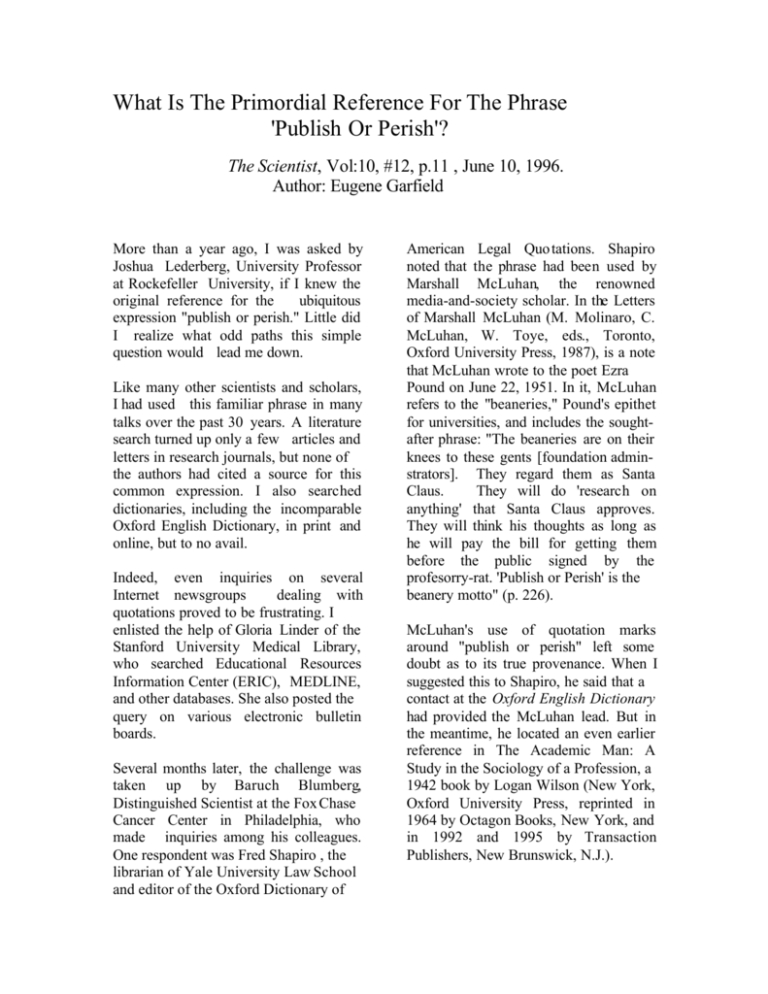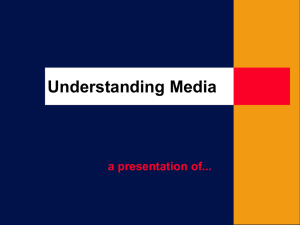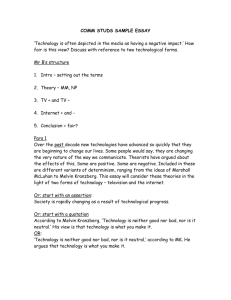What is the Primordial Reference for the phrase
advertisement

What Is The Primordial Reference For The Phrase 'Publish Or Perish'? The Scientist, Vol:10, #12, p.11 , June 10, 1996. Author: Eugene Garfield More than a year ago, I was asked by Joshua Lederberg, University Professor at Rockefeller University, if I knew the original reference for the ubiquitous expression "publish or perish." Little did I realize what odd paths this simple question would lead me down. Like many other scientists and scholars, I had used this familiar phrase in many talks over the past 30 years. A literature search turned up only a few articles and letters in research journals, but none of the authors had cited a source for this common expression. I also searched dictionaries, including the incomparable Oxford English Dictionary, in print and online, but to no avail. Indeed, even inquiries on several Internet newsgroups dealing with quotations proved to be frustrating. I enlisted the help of Gloria Linder of the Stanford University Medical Library, who searched Educational Resources Information Center (ERIC), MEDLINE, and other databases. She also posted the query on various electronic bulletin boards. Several months later, the challenge was taken up by Baruch Blumberg, Distinguished Scientist at the Fox Chase Cancer Center in Philadelphia, who made inquiries among his colleagues. One respondent was Fred Shapiro , the librarian of Yale University Law School and editor of the Oxford Dictionary of American Legal Quo tations. Shapiro noted that the phrase had been used by Marshall McLuhan, the renowned media-and-society scholar. In the Letters of Marshall McLuhan (M. Molinaro, C. McLuhan, W. Toye, eds., Toronto, Oxford University Press, 1987), is a note that McLuhan wrote to the poet Ezra Pound on June 22, 1951. In it, McLuhan refers to the "beaneries," Pound's epithet for universities, and includes the soughtafter phrase: "The beaneries are on their knees to these gents [foundation adminstrators]. They regard them as Santa Claus. They will do 'research on anything' that Santa Claus approves. They will think his thoughts as long as he will pay the bill for getting them before the public signed by the profesorry-rat. 'Publish or Perish' is the beanery motto" (p. 226). McLuhan's use of quotation marks around "publish or perish" left some doubt as to its true provenance. When I suggested this to Shapiro, he said that a contact at the Oxford English Dictionary had provided the McLuhan lead. But in the meantime, he located an even earlier reference in The Academic Man: A Study in the Sociology of a Profession, a 1942 book by Logan Wilson (New York, Oxford University Press, reprinted in 1964 by Octagon Books, New York, and in 1992 and 1995 by Transaction Publishers, New Brunswick, N.J.). In a chapter on prestige and the research function, Wilson stated: "The prevailing pragmatism forced upon the academic group is that one must write something and get it into print. Situational imperatives dictate a 'publish or perish' credo within the ranks" (p. 197). However, Wilson did not provide a reference and-aga in-the telltale quotation marks raise a question whether he was citing or coining the phrase. Since Wilson was a sociologist, I suspected he might be known to Robert K. Merton, professor, emeritus, at Columbia University, the eminent sociologist of science whom I also consulted in the effort to trace the elusive origin of the phrase. Merton is coeditor with David Sills of The Macmillan Book of Social Science Quotations: Who Said What, When, and Where (New York, Macmillan, 1992). You can imagine my surprise upon learning that Wilson had been Merton's student at Harvard University. He later became president of the University of Texas and, subsequently, president of the American Council on Education. Merton and others familiar with pre-war academe believe that "publish or perish" was a term in fairly common usage at the time. On a hunch, I searched the Social Sciences Citation Index and found that Carol Tenopir of the University of Tennessee, Knoxville, recently referred to Wilson's book (Library Trends, 43:571-91, 1995). She mentioned Wilson's use of "publish or perish" but was unable to verify whether anyone else had used it before him. Perhaps one of The Scientist's readers can identify an earlier source for this common phrase. ____________________________





